#I love ironic use of religiously-themed music
Explore tagged Tumblr posts
Text
No thoughts, head empty, just Angel and Gabe sloppily making out in their hiding closet. The camera slowly pulls back and "Amazing Grace" plays in the background with increasing volume.
#jimち asmr#jim asmr#die society#he was so adorably apologetic and the collar of his cossack was very tempting for pulling him closer#sometimes my brain refuses to present things to me in writing only in cinematography - with music and camera movements#I love ironic use of religiously-themed music#like when a person is excommunicated from church and is now desperately rubbing bodies with a supernatural being
14 notes
·
View notes
Text
jojo siwa claiming she's revitalizing gay pop and releasing 'karma' on the same night as conan gray's 'found heaven' and chappell roan's 'good luck babe' is so poetically ironic. it's like the universe WANTS to draw a comparison between jojo and queer pop artists.
the thing that makes queer pop compelling as a genre is the unique storytelling and experiences of queer artists told through their music. that doesn't necessarily mean every song by a queer artist has to be about their queerness. they don't have to scream "hey i'm gay!" in every single song they write. but claiming to be "reinventing gay pop" should mean you're telling interesting stories about your queer experience, right???
'found heaven' by conan gray is about growing up as a queer kid with religious guilt and disapproving parents. he equates being in love in an authentic way to "finding heaven", and the piece as a whole resonates with a TON of queer people in different stages of their lives. some people can look back at their childhoods and how much they've grown since then, some can relate because they're currently going through what conan's written about, and some people can sympathize with the way some queer people are treated, even if they aren't necessarily queer themselves.
'good luck babe' is a song about queerness and compulsory heterosexuality. chappell sings about a woman she was in a relationship with who decided to settle down in a conventional marriage despite being queer. the song reflects the denial a lot of queer people go through (specifically regarding the lesbian experience) and the unfortunate way a lot of them end up repressing who they are to conform to societal standards. it's fun, it's campy, but its message is still poignant.
as for karma… there's nothing inherently queer about that song. the music video for the original version, ‘karma’s a bitch’ by brit smith, featured a heterosexual storyline. jojo buying the rights to a song she didn't write isn't inherently a bad thing, a lot of mainstream artists do that all the time. however, if you're claiming to be a pioneer of the “gay pop” genre and your music doesn't reflect any queer themes or experiences, is it really “gay pop”? again, queer artists don't have to write exclusively about their queerness, but if you try to present yourself as a voice for the queer community without telling any of their stories, you're not going to be lauded as some revolutionary figure. if any of the songs on jojo’s album are actually about her experience as a lesbian or contain any queer themes, then i think she'd qualify as a “gay pop” artist. but so far, she's given us a faux edgy, generic pop song and tried to market it as some insane never-been-done-before feat. and honestly, if her entire album is like this and she continues to market herself this way, it's a slap in the face to all the genuine artists and storytellers in the queer community.
but let's stop talking about jojo siwa and start talking about the incredible queer artists who are truly breathing life into the "gay pop" genre: chappell roan, renee rapp, ben platt, conan gray, girl in red, kevin atwater, baby queen, mitski, clairo, dodie, and SO MANY MORE (feel free to add on some of your favourites because there are so many wonderful artists out there <3)
also: if you have a different perspective on this situation i would absolutely love to hear what you think and if you agree / disagree with this! i love discussing topics like this so feel free to reblog with your own take
#jojo siwa#karma#chappell roan#conan gray#queer pop#also the fact that this rebrand is a coverup for jojo's awful behavior#like be fucking fr#don't use the queer community as a sheild
1K notes
·
View notes
Text
JTTW Chapter 19
Chapter 19 for the @journeythroughjourneytothewest Reading Group!
Once again I really like the theme of working for your abilities. Zhu Bajie wasn’t a chosen one, he had to work hard to become an Immortal, though his meeting with the true Immortal was lucky of course.
It’s quite curious how often Sun Wukong has a hard time getting inside caves, either outright by being barred or due to some other thing. Something to keep an eye on.
I believe he didn’t just head back to check in on his Shifu, but also to clarify some things with old Mr. Gao.
In the J. F. Jenner translation after Tang Sanzang asks where Sun Wukong was all night, Wukong says “[h]e's no common or garden ghost” referring to Zhu Bajie, which made me think of the HTTYD books and the common or garden dragon, which is how I managed to figure the meaning. Afterwards I actually looked up the specific meaning of calling something common or garden, which is used to describe something you think is ordinary and not special in any way.
Ah it’s always the problem of appearance. A tale as old as time I feel.
“[A] man who breaks someone's door and enters without permission may be guilty of trespassing” I think that’s not just trespassing, that’s breaking and entering.
‘Ice iron’ sounds like such a JRPG term, I wonder if it’s ever been used as such. It might, but if it hasn’t that’s potential untapped if you ask me.
So it’s been years since Guanyin came by, huh. She must have been quite thorough at surveying the path then if it took this long!
Nice to see they manage to talk it out like that this time. Progress compared to the dragon instance.
Why does Sun Wukong insist on arson? There is a disproportionate amount of arson in relation to him, I wonder if this will persist into later chapters or not. Another thing to keep an eye on!
Okay, so Monkey is Metal and Zhu Bajie is associated with Wood, good let’s keep track of that.
Oh yeah, I can see why people may entertain a ship between those two. This poem just lends itself to that interpretation. Like overtly so.
Tang Sanzang just doesn’t get to actually name anyone. Only ever nicknames, it’s kind of funny.
Also interestingly enough in the J. F. Jenner translation it is Sun Wukong who remarks on their religious names matching.
Sun Wukong admitting to being a lightweight, we love to see a king knowing his limits.
Also very nice that Tang Sanzang allows them to have wine but draws the line at them getting drunk. Reminds me a bit of our lovely Paladin from DnD Honour Among Thieves. He’s got his code, but he is willing to adjust it to work with the world around him.
Hold on a moment, the Eight Rules forbid dancing and music?! I need to look into that a bit more, because if it is how it appears at face value I don’t know how to feel about this.
Very sweet of Sun Wukong to give Gao Cai some of the money!
Verdant returns! Zhu Bajie’s new outfit is actually verdant.
Blue and pink phoenixes you say? Trans pride phoenixes perhaps? That’s what I’m imagining anyway.
Deer check time! In the Chinese original it is a [麋鹿 Mílù] in English known as Père David's deer!

Wait, the guy literally hangs out in a crow’s nest? That’s pretty neat.
Oooh Sha Wujing foreshadowing! No mention of our Bailong Ma this chapter though, sad.
#xiyouji#journey to the west#jttw#sun wukong#monkey king#tang sanzang#zhu wuneng#zhu bajie#jttw reading group#jttw book club#père david's deer
14 notes
·
View notes
Text
Why, Yes, Yes I Do
“Do you still listen to that Heavy Metal Devil Music?” asked my least favorite Uncle during one holiday family gathering that we always had around this time of the year. I was just out of high school and was probably wearing a band t-shirt. A huge part of me wanted to stick my tongue out, put fingers up by my head like devil horns and talk like a demon possessed. But I was raised better than that, so my Uncle trying to belittle me wasn't going to work. I just answered “Why, yes, yes I do.” Honestly, nothing I could have said would have changed his opinion of me, and I already knew the man was a complete asshole.
But looking back I think it's so odd that people get worked up about something, even if they haven't really researched it or looked into it themselves. My Uncle was going by whatever he had heard from some fear-mongering religious zealot spewing crap about how heavy metal music was destroying the youth who listened to it and opening the door for Satan to waltz right in and take their souls. I can still remember some religious folks outside of the venue when I saw Iron Maiden back in the 80s. They didn't save my soul. The music did.
I could have explained to my Uncle that a lot of my favorite music at that time was educational. Like the band I mentioned above, Iron Maiden, so well known for a song and album called “The Number Of The Beast.” They had peaked my interest in (Satan? No!) history and literature and mythology. Songs about Edgar Allen Poe stories, one about the plight of the Native Americans, one about the poem the Rime of the Ancient Mariner and even one about the great sci-fi novel Dune. The story of Daedalus and Icarus was also the subject of a song, as was the Battle Of Britain and countless other subjects and themes that had nothing to do with Satan. I found all of it fascinating.
Also back then Metallica was dropping songs about the horrors of addiction, the hell that is war and even the struggle that is depression. It wasn't all just about banging your head, although that part was a lot of fun! For me, just knowing others dealt with depression at a time when so few people discussed it was refreshing. It somehow made it easier to fight and deal with.
And the brotherhood that many fans of bands have is amazing. If I'm wearing a Slayer shirt and walk past someone else wearing one then at least one of us is going to yell “Slayer!” There are always some bad exceptions, but for the most part I always found the metal scene being very accepting of everyone. It didn't matter if you were male, female, black, white, gay or straight or whatever. If you were at a show then you were part of a large family of headbanging freaks. Hell, I made a good friend once just because both of us were browsing the metal imports at the local record store.
I remember going to a show with my cousin back in the day. (One of the asshole Uncle's children) Once the band started playing all of the sudden my cousin and the guy beside him are singing together, bumping into each other, sometimes arm in arm and just totally enjoying every second and soaking in the energy of the music. The two guys didn't know each other, they just had a mutual love of the band playing and the music. It was beautiful. They didn't become friends after the show, they just enjoyed that moment in time.
So I guess I could have tried to explain all of this to my rude Uncle when he asked me if I was still listening to that Heavy Metal Devil Music stuff. But I doubt he would have understood that there was (and still is) so much more under the surface of metal music.
--- Tim (@big-low-t) ---
10 notes
·
View notes
Text
The Boys s4 ep4 reaction
huh
what?
fuck.
FUCK yeah Hughie fight like a Campbell! by which I mean doing a lot of damage with a very small knife, fighting while actively being choked out, using a shield WRONG, having Problems(tm) with inconveniently placed pieces of iron, making faustian bargains at the direct expense of your family members because you'd rather they be monsters than dead, and getting less likeable every minute
~~Just Campbell Things~~
(but seriously go get your ankle checked out worstie <3)
Collin is fascinating to me folklorically, but he shouldve killed Frenchie. cmon man you know yours wasn't the only family he killed. (idgaf abt "the plot", he shouldve. why is Frenchie even in the show fr like WHY ARE YOU HERE.)
I will say the pacing was GREATLY improved. religious themes out the wazoo this ep. love(derogatory) whatever Butcher has going on, batmanass. Sage is hot (WHAT GODDESS IS SHE. THATS NOT A FIGURE OF SPEECH) and relatable enough that I'm sure they actually consulted neurodivergent ppl for writing her
a lot of these shows lately are dealing with fatherhood & mortality from the father's point of view. its a fine story to tell but I am 25. I wish more shows like Gen V existed- most good shows rn seem to focus on either high schoolers or older men.
SERIOUSLY you could write ESSAYS on the religious imagery in this ep. its giving Raphaelite, and... well
yall know what else its giving
I really don't understand who decided that "vaguely descending minor keys played badly on either an overtuned banjo or an undertuned sitar" was going to be the musical shorthand for "evil crazy and inhuman" but it is and tbh it takes me out of the scene. here's the worst thing you've ever seen in fiction, used to convey a brain-bending point about the human condition. and also here's someone vaguely pawing at an the world's highest-tension banjo. like ???
that being SAID, the pacing is beginning to really slow down to a normal speed/normal rate of co-existing plotlines. im very happy with that and hope it keeps up for the rest of the season. it almost feels victorian-dime-novel-esque, like the good ones, Dickensian yknow? a ton of seemingly random people/places/interactions that you have to watch for a bit before they all weave together into one narrative. I REALLY hope thats what they're doing here.
HWAT is the deal with coffee as a metaphor for deception/illusion/betrayal & secrets/"all is not what it appears"? did the execs of every Amazon show get some memo that we all missed? is this part of a pre existing trope or tradition and i just dont know it?
#The Boys is. shockingly. also a show i just like for what it is#anyway. back to herbology (yes i should be packing#the boys#the boys s4 spoilers#the boys season 4#the boys spoilers
6 notes
·
View notes
Text
Assigning Milgram Characters Mili Songs
combining my favorite media for maximum serotonin! i hope other people do milgram song assignments because i will listen to your favorite song if you tell me it reminds you of my fav milgram character.
(IF ES WAS HERE THEY'D GET STRING THEOCRACY OR EXTENSION OF YOU!!!)
Haruka — Birthday Kid
"In my dreams, you praised me and clapped. Then mommy said, 'It's alright, there's always next time. You did your best""
I was so tempted to put in Ocean Bby instead so I could post the spotify cover of a guy in the mili mascot costume smoking but. unfortunately. Birthday Kid is clearly the better Haruka song. Themes of wishing for a family, coping with loneliness, and believing it's your fault you lost everything. #Harukacore
Yuno — Sideshow Duckling
"Golden Rouge. The duckling rubbed it and thought 'I'm enough to win my own approval'."
I'm not too sure about this one but the overall story struck me as Yuno? It's a bit hard to explain but the sweet yet insecure swan revealing a darker version of herself and learning to love herself felt similar to Yuno's Umbilical/Teardrop arc. I feel like there's probably a better song out there though.
Fuuta — Rightfully
"Lubricate our blades with blood and tears, and your piercing screams are music to celebrate."
I'm not too sure about this choice but I think it's passable? The fantasy chanting, the knight motifs, the dnd refetence, rallying with a group to defeat an enemy, it feels #Fuutacore. Alternately I'd consider Iron Flower but that's solely for the fire motifs.
Mu — Mitsubachi
"Everybody has two distinct faces Don’t you agree? Are you saying you’re special? Oh stop dreaming will you?"
Some of my choices barely fit meanwhile Mu recieves the bilingual french-japanese song called Honeybee. I don't think I need to explain this assignment any further.
Shidou — Bulbel
"I’m still my insufferable self. Setting my hair on fire, giving you warmth. Hoping you’d realize I want you by my side. May the lilies bloom for me."
Wow, Shidou gets the coffin flower song who could have foreseen this. I think the song's theme of going through several sacrifices in exchange for the happiness of someone you love fits him well enough.
Mahiru — From A Place Of Love
"There's just so much work, too much work to be done. Committing to commitments. Hiding my indulgence. The freedom we sacrifice for love."
Mili has a roster of sad romantic songs so this is a honestly a tie between this song, Turtle Heart, and Bathtub Mermaid. However, I settled From A Place Of Love becausw the song's progression from enjoying eachother's company to being thrusted into marriage too soon and then realizing you regret ever being in a relationship together struck me as #Mahirucore.
Kazui— And Then Is Heard No More
"Would you say that someone who had every intention to be brave was a coward?"
Kazui got the soft ballad song again! It's hard for me to describe it but I think this is a good pick for him? Feeling dispirited because of your inactions and thinking about how your life could've been with someone who's dead. It really resonates with me but I'm not confident enough with my knowledge regarding Kazui.
Amane — My Creator
"I wish you were here, I wish you were here. You would have been so proud of my achievements."
I think Mortal With You is also a good Amane pick but I felt more inclined for My Creator. Sometimes it's obscure when Amane's talking about "Father" if she means her actual dad or her God. I think My Creator being about someone's abused experiment wanting the love of their Father/God/Creator fits her along with the religious motifs.
Mikoto — Camelia
"Nobody is born a fighter, there isn't enough space for all of us. You don't have to act so tough. No one can make you budge."
I hate this pick so much this is easily the worst but I couldn't find anything for Mikoto. I settled for Camelia because one of Mikoto's major themes is protecting himself, and Camelia is about an elder sister protecting her younger one by shooting a man. The reasoning is shoddy and if anyone can provide a better song I love you.
Kotoko — Paper Bouquet
"If the future needs a billion samples of flowers, I’m your reaper. I’ve no colour so the least I can do for you is endure."
Whereas Mikoto is protecting himself, Kotoko wants to protect others. There's lots of Mili songs where the narrator wants to do something for the sake of the one they love but in the end I settle on Paper Bouquet for Kotoko. I'm not too sure about but I think the chorus about "a means to an end," and having to bury a highschool student would be something that'd spur Kotoko into protecting those weaker than her. Does that make sense?
#milgram#i had to listen to so many mili songs back to back to back for this#pros: i found some new songs i like!#cons: oh my god my brain was fried afterwards#if you've never seen ocean bby this is your sign to go look it up on YouTube#꒰ 🌼 ꒱ ── cinnamon prattles
26 notes
·
View notes
Text
PT. 2 of my insane, song-by-song review of Taylor Swift's university textbook AKA TTPD
Part 1 is here. Read the remainder under the cut, and don't forget, it's always a good idea to be galaxy-brained about Taylor Swift music.
6. “Florida!!!” (feat. Florence + the Machine) 3:35 (Taylor Swift, Florence Welch) Here's my problem with Florida exclamation point exclamation point exclamation point: it begs comparison to "no body, no crime," and it doesn't live up to the latter. I choose to interpret Florida!!! as a work of art that is influenced but not determined by real life events, and therefore, I will not speculate about what "happened" in Florida!!! Within the world of the song, Taylor Swift has some bodies buried in Florida--but there was a real opportunity for clever wordplay and references to real places, people or things from Florida. I was waiting for a reference to Florida Man and it wasn't there—why? Something was missing from the lyrics here.
7. “Guilty as Sin?” 4:14 (Taylor Swift, Jack Antonoff)
Ironically, on an album full of songs labelled E, Taylor's most sexually explicit song contains no such warning. "Guilty As Sin?" is Taylor's horniest song EVER (complimentary.) The verses are chanted in Jack Antonoff's favourite medium-fast pace, but the chorus slows down to chant the absolutely INSANE lyrics, "My bedsheets are ablaze/I've screamed his name/Building up like waves/Crashing over my grave." Taylor retreads familiar religious metaphors towards the end of the song, "I choose you and me/Religiously," referencing earlier songs like "False God" or "Would've, Could've, Should've." It's clearly a metaphor she enjoys and relates deeply to the experience of romance and sexuality. My verdict: "Guilty as Sin?" makes it into my Top 5 of TTPD.
8. “Who’s Afraid of Little Old Me?” 5:34 (Taylor Swift)
"Little Old Me" was written by Taylor alone, without the help of Antonoff or Dessner. I can't help but wonder how this song could have been improved by the addition of either Antonoff's Top 40 earworm sensibility, or Dessner's magical strings and plucked guitar. Lyrically, "Who's Afraid of Little Old Me?" is too obvious. Yes, Taylor Swift is comparing herself to a witch. ("I leap from the gallows/And I levitate down your street.") The problem is that the everybody-hates-me-and-I-crave-revenge energy was thoroughly exhausted by reputation, and after "I Forgot That You Existed," "mad woman," "Karma" and "Vigilante Shit," I just don't have it in my anymore to listen to ANOTHER song on the same general theme, which Swift examines with far less nuance and elegance than the theme of love. I know a lot of fans are identifying this song as one of their top favourites on TTPD, and I know the reason: the chorus SCREAM. Yes, there's one line in the song that sounds fantastic, and it's Taylor's enraged vocals on "WHO'S afraid of little old meeee?" But it's not enough to sustain the whole song.
9. “I Can Fix Him (No Really I Can)” 2:36 (Taylor Swift, Jack Antonoff)
Another song that would have been better served as a co-write with Dessner rather than Antonoff. I like the Western-sounding twinge of guitar, but there simply isn't enough to adorn the very, very simple melody of "I Can Fix Him." Listen, I love cowboy shit and I don't care AT ALL who this song is about. I even love an obviously delusional and self-deprecating song title, so why couldn't I love "I Can Fix Him?" Once again, another TTPD is inviting comparison to its evermore companion and coming up short. "Cowboy Like Me" is rounding up "I Can Fix Him: and delivering him to the sherriff.
10. “loml” 4:37 (Taylor Swift, Aaron Dessner)
Despite a cringeworthy slang title reminiscent of "Since U Been Gone," "loml" is actually a gorgeous, gentle piano ballad about the devastation of love lost. This one's for the "champagne problems" girlies (gender neutral.) Aaron Dessner has ARRIVED, and it shows. The lyrics are intricate with wordplay. Taylor uses metonymy to great effect: "You talked me under the table/Talking rings and talking cradles." The allusions and similes can be a bit chaotic, with Taylor comparing her romance to a fake Impressionist painting, a poem or story written in ink, a black and white movie, The Wizard of Oz (famously technicolour) and Field of Dreams. I would have suggested she cut down the scope of the metaphors and choose one theme to reference throughout the song, as she did on "Would've, Could've, Should've."
11. “I Can Do It With a Broken Heart” 3:38 (Taylor Swift, Jack Antonoff)
Jack Antonoff clearly shaped "I Can Do It With A Broken Heart," with its techno dance-club beat and slightly annoying earworm, "I'm so depressed I act like it's my birthday/I'm so obsessed with him but he avoids me like the plague."
I do like the way Taylor Swift addresses lyrically the topic of her professionalism and commitment to her career, which she discussed in her Time magazine interview. She explained that she will show up to her tour and give 100% on stage no matter how sick she is, how shitty or tired she's feeling, and I think "I Can Do It With A Broken Heart" addresses the question of how it is POSSIBLE to show up every night for an endurance feat like The Eras Tour, especially after breaking up with the man that half of her songs are ABOUT.
But is it a good song? "Broken Heart" is inconsistent. Some sections of the song are enjoyable for me, while others are annoying the way I found the worst songs on 1989. I can't imagine myself listening to this song on repeat like I might for some of my top TTPD tracks, but once in a while, it's a fun ride.
Stay tuned for part 3 of my insanely detailed Tortured Poets Department review!
#the tortured poets department#album review#song review#loml#i can do it with a broken heart#who's afraid of little old me?#florida!!!
3 notes
·
View notes
Quote
Beethoven – Piano Sonata no. 4 in Eb Major, op. 7 (1796) When this work was published, it was called “Grand Sonata for the Piano”, but despite such a Romantic name, the music here doesn’t seem to be associated with the “Romantic” and “Heroic” Beethoven we all know and love. To put things in perspective, the music here does not seem to be for the piano, but rather for the orchestra. It does sound more like a transcription at times. Also, it was unusual, at the time, to publish a sonata by itself. Instead of two or three sonatas, for home practice and entertainment, we get one long sonata by itself, signaling that Beethoven wasn’t going to cater to the middle-class home musician crowd that dominated the piano sonata market of his day. Already, he was thinking of ways to push the limits of the instruments, and the audience’s expectations. It opens with chords playing over a relentless repeated note, something that feels like it should be played by horns or maybe timpani instead of a piano. The music flows through a relatively sunny mood, at times the music pushes the pianistic tendencies for wider expression. Large leaps, and exclamation points in far registers, show that the pianist has to conform to the music, and not the other way around. Otherwise, though, we follow more conventional melodies through the basic structure. Orchestral textures and all. The second movement is the real gem here. It has the poetic, transcendent quality that will come up in Beethoven’s later slow movements. Opening with a four voiced choral, we get a solemn and almost religious passage of music. After the melody plays through, the reiteration includes a bass line that has staccato notes, as if actual basses are plucked. The music turns a shade darker with some chromatics that unsettle the main melody’s prayer. After a sudden thunderous pounding of bass octaves, we get a contrast that sounds like a fearful bird in the higher registers. The distance between notes here is palpable and creepy. This isn’t the typical ‘pretty slow movement’ you’d expect from an ‘entertaining’ piece. The main choral theme comes back in the higher octaves, like bells, trying to bring the mood back. Afterward, we repeat the introduction, and then the piano brings back orchestral textures, softening, like a chiming bell, making us follow through. Here, it is delicate, and without trying I can’t help but think of walking in the woods, of getting away from suburbia and trying to ‘reconnect with nature’. Yeah, music brings out my inner hippie. I can’t help it. The next movement is just ‘allegro’ but it follows the expected ‘minuet’ like intermezzo movement. We rock along with a charming melody that takes us away from the seriousness of the previous movement. There are a few chord slaps that remind us this is Beethoven, not anyone else. The middle section rocks us into some stormy waters, but we don’t stay there for long. The last movement opens with a really calm melody, easy going and almost like a picnic. Ironically, this is the most relaxed movement. In later Beethoven works, we will see the conclusion be heightened to insane proportions, but here we get to relax in the charm of the musical flow. There is a sudden shift into a dramatic flow, something theatric and stormy. It happens a third of the way through, and you don’t expect it, and you don’t know where it will carry you, but soon it subsides and you return to the peace of the opening. This isn’t my favorite Beethoven sonata. If I’m going to be frank and honest, I didn’t expect I’d ever write about this one. Because I used to find it so dull, relative to his other works. Which I think is one of the top reasons that his ‘early period’ doesn’t get as much attention. It doesn’t get the recognition it deserves, if I have to call upon a cliché. But there are wonderful moments and aspects of this sonata that demand attention, that remind me it shouldn’t be ignored. At first glance it’s the second movement, with its range of emotion, and then there are the sprinkles of expressive surprises, but overall the music is in a larger scope than the sonatas that came before, and even if Beethoven is ‘playing it safe’, it is still…Beethoven! It is still pushing limits, and expectations, and taking us in directions we wouldn’t have predicted on our own. Movements: 1. Allegro con molto 2. Largo, con gran espressione 3. Allegro 4. Rondo: Poco allegretto e grazioso
mikrokosmos: Beethoven – Piano Sonata no. 4 in Eb Major, op. 7 (1796) When this work was published, it was called “Grand Sonata for the Piano”, but despite such a Romantic name, the music here doesn’t seem to be associated with the “Romantic” and “Heroic” Beethoven we all know and love. To put things in…
0 notes
Quote
Beethoven – Piano Sonata no. 4 in Eb Major, op. 7 (1796) When this work was published, it was called “Grand Sonata for the Piano”, but despite such a Romantic name, the music here doesn’t seem to be associated with the “Romantic” and “Heroic” Beethoven we all know and love. To put things in perspective, the music here does not seem to be for the piano, but rather for the orchestra. It does sound more like a transcription at times. Also, it was unusual, at the time, to publish a sonata by itself. Instead of two or three sonatas, for home practice and entertainment, we get one long sonata by itself, signaling that Beethoven wasn’t going to cater to the middle-class home musician crowd that dominated the piano sonata market of his day. Already, he was thinking of ways to push the limits of the instruments, and the audience’s expectations. It opens with chords playing over a relentless repeated note, something that feels like it should be played by horns or maybe timpani instead of a piano. The music flows through a relatively sunny mood, at times the music pushes the pianistic tendencies for wider expression. Large leaps, and exclamation points in far registers, show that the pianist has to conform to the music, and not the other way around. Otherwise, though, we follow more conventional melodies through the basic structure. Orchestral textures and all. The second movement is the real gem here. It has the poetic, transcendent quality that will come up in Beethoven’s later slow movements. Opening with a four voiced choral, we get a solemn and almost religious passage of music. After the melody plays through, the reiteration includes a bass line that has staccato notes, as if actual basses are plucked. The music turns a shade darker with some chromatics that unsettle the main melody’s prayer. After a sudden thunderous pounding of bass octaves, we get a contrast that sounds like a fearful bird in the higher registers. The distance between notes here is palpable and creepy. This isn’t the typical ‘pretty slow movement’ you’d expect from an ‘entertaining’ piece. The main choral theme comes back in the higher octaves, like bells, trying to bring the mood back. Afterward, we repeat the introduction, and then the piano brings back orchestral textures, softening, like a chiming bell, making us follow through. Here, it is delicate, and without trying I can’t help but think of walking in the woods, of getting away from suburbia and trying to ‘reconnect with nature’. Yeah, music brings out my inner hippie. I can’t help it. The next movement is just ‘allegro’ but it follows the expected ‘minuet’ like intermezzo movement. We rock along with a charming melody that takes us away from the seriousness of the previous movement. There are a few chord slaps that remind us this is Beethoven, not anyone else. The middle section rocks us into some stormy waters, but we don’t stay there for long. The last movement opens with a really calm melody, easy going and almost like a picnic. Ironically, this is the most relaxed movement. In later Beethoven works, we will see the conclusion be heightened to insane proportions, but here we get to relax in the charm of the musical flow. There is a sudden shift into a dramatic flow, something theatric and stormy. It happens a third of the way through, and you don’t expect it, and you don’t know where it will carry you, but soon it subsides and you return to the peace of the opening. This isn’t my favorite Beethoven sonata. If I’m going to be frank and honest, I didn’t expect I’d ever write about this one. Because I used to find it so dull, relative to his other works. Which I think is one of the top reasons that his ‘early period’ doesn’t get as much attention. It doesn’t get the recognition it deserves, if I have to call upon a cliché. But there are wonderful moments and aspects of this sonata that demand attention, that remind me it shouldn’t be ignored. At first glance it’s the second movement, with its range of emotion, and then there are the sprinkles of expressive surprises, but overall the music is in a larger scope than the sonatas that came before, and even if Beethoven is ‘playing it safe’, it is still…Beethoven! It is still pushing limits, and expectations, and taking us in directions we wouldn’t have predicted on our own. Movements: 1. Allegro con molto 2. Largo, con gran espressione 3. Allegro 4. Rondo: Poco allegretto e grazioso
mikrokosmos: Beethoven – Piano Sonata no. 4 in Eb Major, op. 7 (1796) When this work was published, it was called “Grand Sonata for the Piano”, but despite such a Romantic name, the music here doesn’t seem to be associated with the “Romantic” and “Heroic” Beethoven we all know and love. To put things in…
0 notes
Quote
Beethoven – Piano Sonata no. 4 in Eb Major, op. 7 (1796) When this work was published, it was called “Grand Sonata for the Piano”, but despite such a Romantic name, the music here doesn’t seem to be associated with the “Romantic” and “Heroic” Beethoven we all know and love. To put things in perspective, the music here does not seem to be for the piano, but rather for the orchestra. It does sound more like a transcription at times. Also, it was unusual, at the time, to publish a sonata by itself. Instead of two or three sonatas, for home practice and entertainment, we get one long sonata by itself, signaling that Beethoven wasn’t going to cater to the middle-class home musician crowd that dominated the piano sonata market of his day. Already, he was thinking of ways to push the limits of the instruments, and the audience’s expectations. It opens with chords playing over a relentless repeated note, something that feels like it should be played by horns or maybe timpani instead of a piano. The music flows through a relatively sunny mood, at times the music pushes the pianistic tendencies for wider expression. Large leaps, and exclamation points in far registers, show that the pianist has to conform to the music, and not the other way around. Otherwise, though, we follow more conventional melodies through the basic structure. Orchestral textures and all. The second movement is the real gem here. It has the poetic, transcendent quality that will come up in Beethoven’s later slow movements. Opening with a four voiced choral, we get a solemn and almost religious passage of music. After the melody plays through, the reiteration includes a bass line that has staccato notes, as if actual basses are plucked. The music turns a shade darker with some chromatics that unsettle the main melody’s prayer. After a sudden thunderous pounding of bass octaves, we get a contrast that sounds like a fearful bird in the higher registers. The distance between notes here is palpable and creepy. This isn’t the typical ‘pretty slow movement’ you’d expect from an ‘entertaining’ piece. The main choral theme comes back in the higher octaves, like bells, trying to bring the mood back. Afterward, we repeat the introduction, and then the piano brings back orchestral textures, softening, like a chiming bell, making us follow through. Here, it is delicate, and without trying I can’t help but think of walking in the woods, of getting away from suburbia and trying to ‘reconnect with nature’. Yeah, music brings out my inner hippie. I can’t help it. The next movement is just ‘allegro’ but it follows the expected ‘minuet’ like intermezzo movement. We rock along with a charming melody that takes us away from the seriousness of the previous movement. There are a few chord slaps that remind us this is Beethoven, not anyone else. The middle section rocks us into some stormy waters, but we don’t stay there for long. The last movement opens with a really calm melody, easy going and almost like a picnic. Ironically, this is the most relaxed movement. In later Beethoven works, we will see the conclusion be heightened to insane proportions, but here we get to relax in the charm of the musical flow. There is a sudden shift into a dramatic flow, something theatric and stormy. It happens a third of the way through, and you don’t expect it, and you don’t know where it will carry you, but soon it subsides and you return to the peace of the opening. This isn’t my favorite Beethoven sonata. If I’m going to be frank and honest, I didn’t expect I’d ever write about this one. Because I used to find it so dull, relative to his other works. Which I think is one of the top reasons that his ‘early period’ doesn’t get as much attention. It doesn’t get the recognition it deserves, if I have to call upon a cliché. But there are wonderful moments and aspects of this sonata that demand attention, that remind me it shouldn’t be ignored. At first glance it’s the second movement, with its range of emotion, and then there are the sprinkles of expressive surprises, but overall the music is in a larger scope than the sonatas that came before, and even if Beethoven is ‘playing it safe’, it is still…Beethoven! It is still pushing limits, and expectations, and taking us in directions we wouldn’t have predicted on our own. Movements: 1. Allegro con molto 2. Largo, con gran espressione 3. Allegro 4. Rondo: Poco allegretto e grazioso
mikrokosmos: Beethoven – Piano Sonata no. 4 in Eb Major, op. 7 (1796) When this work was published, it was called “Grand Sonata for the Piano”, but despite such a Romantic name, the music here doesn’t seem to be associated with the “Romantic” and “Heroic” Beethoven we all know and love. To put things in…
0 notes
Quote
Beethoven – Piano Sonata no. 4 in Eb Major, op. 7 (1796) When this work was published, it was called “Grand Sonata for the Piano”, but despite such a Romantic name, the music here doesn’t seem to be associated with the “Romantic” and “Heroic” Beethoven we all know and love. To put things in perspective, the music here does not seem to be for the piano, but rather for the orchestra. It does sound more like a transcription at times. Also, it was unusual, at the time, to publish a sonata by itself. Instead of two or three sonatas, for home practice and entertainment, we get one long sonata by itself, signaling that Beethoven wasn’t going to cater to the middle-class home musician crowd that dominated the piano sonata market of his day. Already, he was thinking of ways to push the limits of the instruments, and the audience’s expectations. It opens with chords playing over a relentless repeated note, something that feels like it should be played by horns or maybe timpani instead of a piano. The music flows through a relatively sunny mood, at times the music pushes the pianistic tendencies for wider expression. Large leaps, and exclamation points in far registers, show that the pianist has to conform to the music, and not the other way around. Otherwise, though, we follow more conventional melodies through the basic structure. Orchestral textures and all. The second movement is the real gem here. It has the poetic, transcendent quality that will come up in Beethoven’s later slow movements. Opening with a four voiced choral, we get a solemn and almost religious passage of music. After the melody plays through, the reiteration includes a bass line that has staccato notes, as if actual basses are plucked. The music turns a shade darker with some chromatics that unsettle the main melody’s prayer. After a sudden thunderous pounding of bass octaves, we get a contrast that sounds like a fearful bird in the higher registers. The distance between notes here is palpable and creepy. This isn’t the typical ‘pretty slow movement’ you’d expect from an ‘entertaining’ piece. The main choral theme comes back in the higher octaves, like bells, trying to bring the mood back. Afterward, we repeat the introduction, and then the piano brings back orchestral textures, softening, like a chiming bell, making us follow through. Here, it is delicate, and without trying I can’t help but think of walking in the woods, of getting away from suburbia and trying to ‘reconnect with nature’. Yeah, music brings out my inner hippie. I can’t help it. The next movement is just ‘allegro’ but it follows the expected ‘minuet’ like intermezzo movement. We rock along with a charming melody that takes us away from the seriousness of the previous movement. There are a few chord slaps that remind us this is Beethoven, not anyone else. The middle section rocks us into some stormy waters, but we don’t stay there for long. The last movement opens with a really calm melody, easy going and almost like a picnic. Ironically, this is the most relaxed movement. In later Beethoven works, we will see the conclusion be heightened to insane proportions, but here we get to relax in the charm of the musical flow. There is a sudden shift into a dramatic flow, something theatric and stormy. It happens a third of the way through, and you don’t expect it, and you don’t know where it will carry you, but soon it subsides and you return to the peace of the opening. This isn’t my favorite Beethoven sonata. If I’m going to be frank and honest, I didn’t expect I’d ever write about this one. Because I used to find it so dull, relative to his other works. Which I think is one of the top reasons that his ‘early period’ doesn’t get as much attention. It doesn’t get the recognition it deserves, if I have to call upon a cliché. But there are wonderful moments and aspects of this sonata that demand attention, that remind me it shouldn’t be ignored. At first glance it’s the second movement, with its range of emotion, and then there are the sprinkles of expressive surprises, but overall the music is in a larger scope than the sonatas that came before, and even if Beethoven is ‘playing it safe’, it is still…Beethoven! It is still pushing limits, and expectations, and taking us in directions we wouldn’t have predicted on our own. Movements: 1. Allegro con molto 2. Largo, con gran espressione 3. Allegro 4. Rondo: Poco allegretto e grazioso
mikrokosmos: Beethoven – Piano Sonata no. 4 in Eb Major, op. 7 (1796) When this work was published, it was called “Grand Sonata for the Piano”, but despite such a Romantic name, the music here doesn’t seem to be associated with the “Romantic” and “Heroic” Beethoven we all know and love. To put things in…
0 notes
Text
I implore people to read the other reblogs as they describe the impact of what Matty did better than I ever could.
I wouldn’t even bother fretting over what this guy thinks about pulling a song. Apparently in an interview from 2 days ago, he used the r slur as an insult towards the Malaysian government (because that shows you’re a respectful person 🤦 /sarc)
From the article: “I am sorry if that offends you and you’re religious and it’s part of your fucking government, but your government are a bunch of fucking [r slur]s and I don’t care anymore. If you push, I am going to push back. I am not in the fucking mood, I’m not in the fucking mood.”
(For those who don’t know, I’m on the spectrum and find the fact he used it as an insult quite offensive. Also, the fact that this article censored the f slur but not the r slur makes me angry)
Apparently he’s also been known to be a generally horrible person (the article below gives a timeline of the kind of things he did)
So I find it pretty ironic for him to be mad at Muse, who took a single song out of their album about revolution. On top of that, the song is assumed to be WAFF, which is more like a “We Didn’t Start the Fire” recap of the 2020s while saying how doomed we are, and therefore not really contributing heavily to the revolution theme like the other songs. (More revolutionary themed songs that come to mind are WOTP, Liberation, Compliance, Verona, so it really shows that Matty doesn’t really know what he’s talking about)
Meanwhile, Matty made it more difficult for Malaysian LGBTQ+ people to be themselves because of his stunt. Progress starts off slowly and by doing what he did, Matty most certainly ended up hurting the people he was trying to “help”
TL;DR: Matty’s not really a good person who ended up hurting the people he said he was trying to “save” and doesn’t really understand anything about Muse or their WOTP album
I again ask you to read the other reblogs as they do this conversation justice and I hope everyone reading has a great day, and remember, you are loved 😊 ❤️
Muse have “pulled one song from their planned KL setlist owing to its title” following Matty Healy in Malaysia-gate. Huh.
#matty healy#muse band#malaysia#kuala lumpur#will of the people#wotp#lgbtq#tw queerphobia#tw homophobia#tw r slur#tw ableism#tw racism#tw nazi mention#(in the second article)#long post#mint mumbles
26 notes
·
View notes
Text
The Supernatural 70s: Part I - Corruption of An Innocent
"We're mutants. There's something wrong with us, something very, very wrong with us. Something seriously wrong with us - we're soldiers writers."
-- with apologies to the screenwriter of "Stripes"
Dear reader, I have the darkest of revelations to make to you, a truth when fully and wholly disclosed shall most assuredly chill you to the bone, a tale that shall make you question all that you hold to be true and good and holy about my personal history. While you may have come in search of that narrative designer best known for his works of interactive high fantasy, you should know that he is also a crafter of a darker art, a scribbler of twisted tales filled with ghosts, and ghouls, and gargoyles. I am, dear innocent, a devotee of horrors! Mwahahahaha!
[cue thunderclap, lightning, pipe organ music]
Given the genre of writing for which most of you know me, I forgive you if you think of me principally as a fantasy writer. I don't object to that classification because I do enjoy mucking about with magic and dark woods and mysterious ancient civilizations. But if you are to truly know who I am as a writer, you must realize that the image I hold of myself is principally as a creator of weird tales.
To understand how and why I came to be drawn to this sub-genre of fantastic fiction, you first must understand that I come from peculiar folks. Maybe I don't have the Ipswich look, or I didn't grow up in a castle, but my pedigree for oddity has been there from the start. My mother was declared dead at birth by her doctor, and often heard voices calling to her in the dead of night that no one else could hear. Her mother would periodically ring us up to discuss events in our lives about which she couldn't possibly have known. My father's people still share ghost stories about a family homestead that burned down mysteriously in the 1960s. Even my older brother has outré memories about events he says cannot possibly be true, and as a kid was kicked off the Tulsa city bookmobile for attempting to check out books about UFOs, bigfoot, and ESP. It's fair to say I was doomed - or destined - for weirdness from the start.
If the above listed circumstances had not been enough, I grew up in an area where neighbors whispered stories about a horrifically deformed Bulldog Man who stalked kids who "parked" on the Old North Road near my house. The state in which I was raised was rife with legends of bigfoots, deer women, and devil men. Even in my childhood household there existed a pantheon of mythological entities invented explicitly to keep me in line. If I was a good boy, The Repairman would leave me little gifts of Hot Wheels cars or candy. If I was being terrible, however, my father would dress in a skeleton costume, rise from the basement and threaten to drag me down into everlasting hellfire (evidently there was a secret portal in our basement.) There were monsters, monsters EVERYWHERE I looked in my childhood world. Given that I was told as a fledgling writer to write what I knew, how could anyone have been surprised that the first stories I wrote were filled with the supernatural?
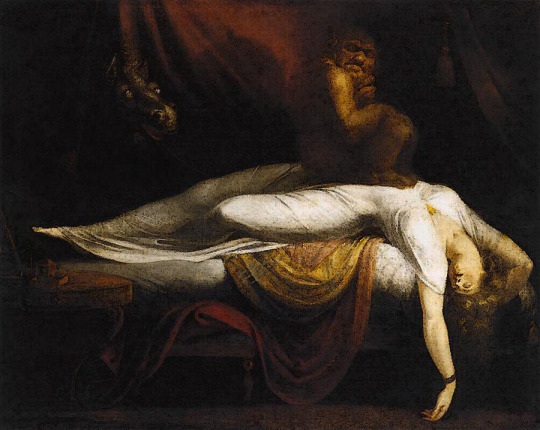
"The Nightmare" by John Henry Fuseli (1781)
My formative years during the late sixties and early seventies took place at a strange juncture in our American cultural history. At the same time that we were loudly proclaiming the supremacy of scientific thought because we'd landed men on the moon, we were also in the midst of a counter cultural explosion of interest in astrology, witchcraft, ghosts, extra sensory perception, and flying saucers. Occult-related books were flying off the shelves as sales surged by more than 100% between 1966 and 1969. Cultural historians would come to refer to this is as the "occult boom," and its aftershocks would impact popular cultural for decades to come.
My first contact with tales of the supernatural were innocuous, largely sanitized for consumption by children. I vividly remember watching Casper the Friendly Ghost and the Disney version of the Legend of Sleepy Hollow. I read to shreds numerous copies of both Where the Wild Things Are and Gus the Ghost. Likely the most important exposure for me was to the original Scooby Doo, Where Are You? cartoon which attempted to inoculate us from our fears of ghosts and aliens by convincing us that ultimately the monster was always just a bad man in a mask. (It's fascinating to me that modern incarnations of Scooby Doo seem to have completely lost this point and instead make all the monsters real.)
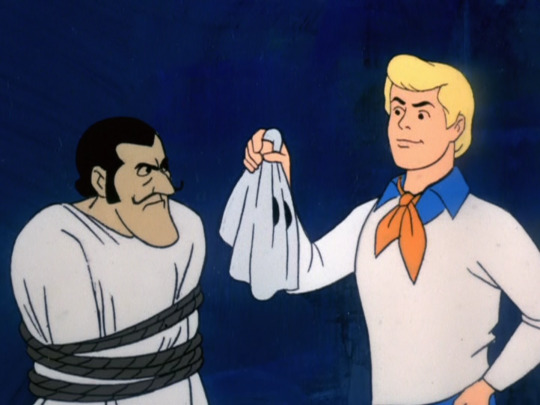
ABOVE: Although the original cartoon Scooby Doo, Where Are You? ran only for one season from 1969 to 1970, it remained in heavy reruns and syndication for decades. It is notable for having been a program that perfectly embodied the conflict between reason and superstition in popular culture, and was originally intended to provide children with critical thinking skills so they would reject the idea of monsters, ghosts, and the like. Ironically, modern takes on Scooby Doo have almost entirely subverted this idea and usually present the culprits of their mysteries as real monsters.
During that same time, television also introduced me to my first onscreen crush in the form of the beautiful and charming Samantha Stevens, a witch who struggles to not to use her powers while married to a frequently intolerant mortal advertising executive in Bewitched. The Munsters and The Addams Family gave me my first taste for "goth" living even before it would become all the rage in the dance clubs of the 1980s. Late night movies on TV would bring all the important horror classics of the past in my living room as Dracula, Frankenstein, the Wolf Man, the Invisible Man, the Phantom of the Opera, The Creature from the Black Lagoon, and Godzilla all became childhood friends. Over time the darkened castles, creaking doors, foggy graveyards, howling wolves, and ever present witches and vampires became so engrained in my psyche that today they remain the "comfort viewing" to which I retreat when I'm sick or in need of other distractions from modern life.
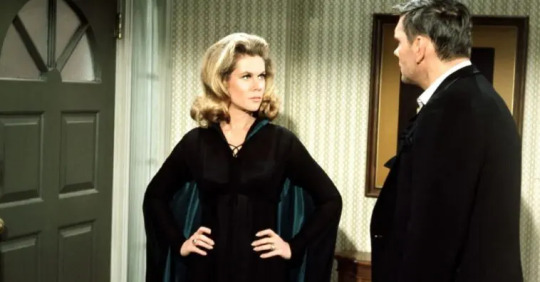
ABOVE: Elizabeth Montgomery starred in Bewitched (1964 - 1972) as Samantha Stephens, a witch who married "mortal" advertising executive Darren Stephens (played for the first five seasons by actor Dick York). Inspired by movies like I Married a Witch (1942) and Bell, Book and Candle (1958), it was a long running series that explored the complex relationship dynamics between those who possess magic and those who don't. Social commentators have referred to it as an allegory both for mixed marriages and also about the challenges faced by minorities, homosexuals, cultural deviants, or generally creative folks in a non heterogeneous community. It was also one of the first American television programs to portray witches not as worshippers of Satan, but simply as a group of people ostracized for their culture and their supernatural skills.
Even before I began elementary school, there was one piece of must-see gothic horror programming that I went out of my way to catch every day. Dark Shadows aired at 3:30 p.m. on our local ABC affiliate in Tulsa, Oklahoma which usually allowed me to catch most of it if I ran home from school (or even more if my mom or brother picked me up.) In theory it was a soap opera, but the show featured a regular parade of supernatural characters and themes. The lead was a 175 year old vampire named Barnabas Collins (played by Johnathan Frid), and the show revolved around his timeless pursuit of his lost love, Josette. It was also a program that regularly dealt with reincarnation, precognition, werewolves, time travel, witchcraft, and other occult themes. Though it regularly provoked criticism from religious groups about its content, it ran from June of 1966 until it's final cancellation in April of 1971. (I would discover it in the early 1970s as it ran in syndication.) Dark Shadows would spin off two feature-length movies based on the original, a series of tie-in novels, an excellent reboot series in 1991 (starring Ben Cross as Barnabas), and a positively embarrassingly awful movie directed by Tim Burton in 1991.
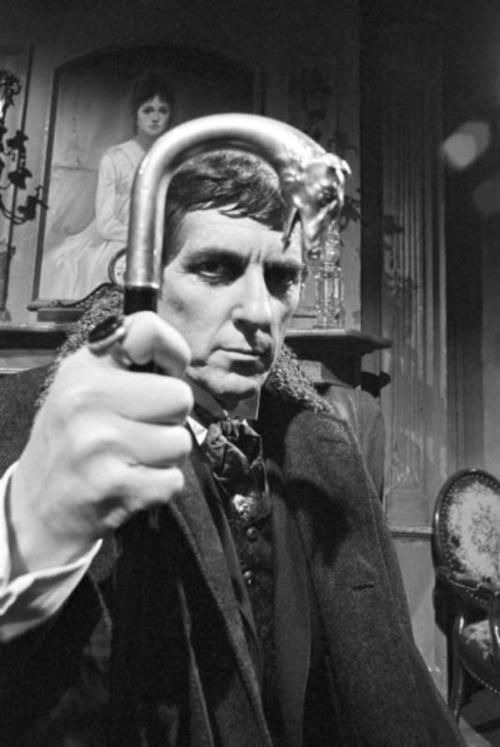
ABOVE: Johnathan Frid starred as Barnabas Collins, one of the leading characters of the original Dark Shadows television series. The influence of the series cannot be understated. In many ways Dark Shadows paved the way for the inclusion of supernatural elements in other soap operas of the 1970s and the 1980s, and was largely responsible for the explosion of romance novels featuring supernatural themes over the same time period.
While Dark Shadows was a favorite early television program for me, another show would prove not only to be a borderline obsession, but also a major influence on my career as a storyteller. Night Gallery (1969-1973) was a weekly anthology television show from Rod Serling, better known as the creator and host of the original Twilight Zone. Like Twilight Zone before it, Night Gallery was a deep and complex commentary on the human condition, but unlike its predecessor the outcomes for the characters almost always skewed towards the horrific and the truly outré. In "The Painted Mirror," an antiques dealer uses a magic painting to trap an enemy in the prehistoric past. Jack Cassidy plots to use astral projection to kill his romantic rival in "The Last Laurel" but accidentally ends up killing himself. In "Eyes" a young Stephen Spielberg directs Joan Crawford in a story about an entitled rich woman who plots to take the sight of a poor man. Week after week it delivered some of the best-written horror television of the early 1970s.
In retrospect I find it surprising that I was allowed to watch Night Gallery at all. I was very young while it was airing, and some of the content was dark and often quite shocking for its time. Nevertheless, I was so attached to the show that I'd throw a literal temper tantrum if I missed a single, solitary episode. If our family needed to go somewhere on an evening that Night Gallery was scheduled, either my parents would either have to wait until after it had aired before we left, or they'd make arrangements in advance with whomever we were visiting to make sure it was okay that I could watch Night Gallery there. I was, in a word, a fanatic.
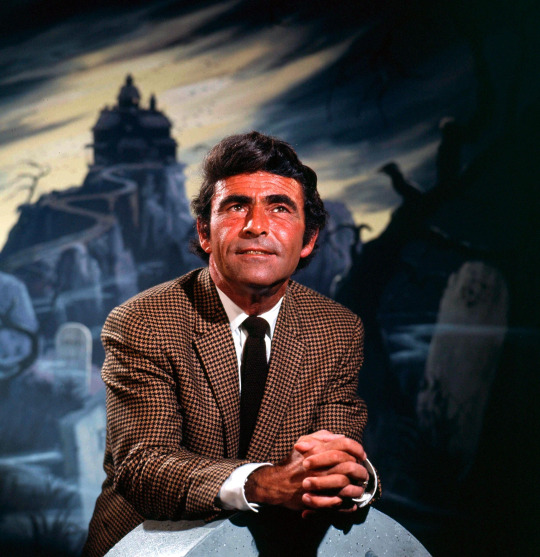
ABOVE: Every segment of Night Gallery was introduced by series creator Rod Serling standing before a painting created explicitly for the series. Director Guillermo del Toro credits Serling's series as being the most important and influential show on his own work, even more so than the more famous Twilight Zone.
7 notes
·
View notes
Text
Lavaborne Fly Us Closer to ‘Black Winged Gods’ in New Vid, “Prove Your Worth”
~Doomed & Stoned Debuts~
By Billy Goate
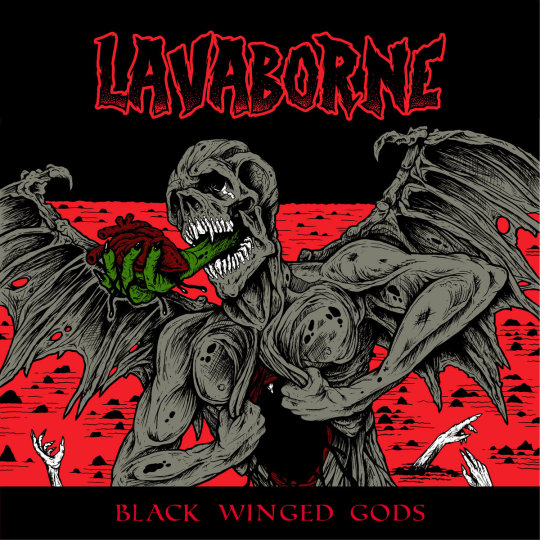
Album Art by Nate Vaught/Brainvault Illustration
If LAVABORNE sounds like an epic name for a band, it's for very good reason. Not only is the Midwest outfit inclined towards epic themes, they have also ignited the use of a descriptor that has been neglected by most music journalists to date: power doom.
You pick up on the spirit lyrically, just as much as musically, in the new music video "Prove Your Worth" (the third single to be released from the Indy handful's forthcoming full-length, Black Winged Gods). The song's ominous opening chords and crooning guitar lead ready us for a tale grandiose, inspired by ancient mythological lore that still has its soul-stirring way with our imaginations.
"Prove Your Worth," says vocalist Chris Latta (who you might recognize from the now defunct doom operation Spirit Division) "was one of the last songs that was finished before we started recording the album. [Guitarist] Brandon Signorino wrote the riffs for this one, with the rest of us filling out the arrangements as it went along. I love how it goes between from the slower first half to the faster climax all while maintaining a triumphant air throughout. The Viking-themed lyrics that I paired with it seemed to be a pretty good fit. This is one of our favorite songs on the album. I want it played at my funeral -- pyre and longboats optional."
I love where his head is at! Surely I'm not the only one who has daydreamed about which songs I'd want played at my wake (while morbid, it is nonetheless a strange bit of fun to work on a playlist of songs echoing one's life journey). The music video not only relays the timeless theme of life triumphing against the odds, but gives us a behind the scenes look at the band in action, whose full line-up includes: Chris Latta on vocals, Brandon Signorino and Freddie Rodriguez manning the guitars, completed by the rhythm section of Brandon Davis and Freddie Rodriguez on bass and drums.
Look for 'Black Winged Gods' (2021) to drop on October 1st, with a CD and cassette release via Wise Blood Records (pre-order here). Stick this in your rotation with Candlemass, Witchfinder General, and Armored Saint and you'll find it a fine companion to epic doom, NWOBHM, and power metal.
Give ear...
Lavaborne - "Prove Your Worth" (music video)
Some Buzz
Indianapolis warriors Lavaborne forge their riffs in the magma of classic metal. Flashback with us to the early and mid-'80s, when Iron Maiden was writing a new classic album every year and Candlemass lit their first flame.
When vocalist Chris Latta and guitarist Brandon Signorino first formed Lavaborne, they envisioned a blend of doom and power metal. Slide on your studded gauntlets and listen to Lavaborne’s Black Winged Gods, a spirited offering of self-described Power Doom that’s a modern ode to epic heavy metal.
“The darker tone and theatrical vocals are rooted in doom, while the faster drums and guitar harmonies are very inspired by more traditional heavy metal,” vocalist Chris Latta describes. “Our core influences are Judas Priest, Iron Maiden, Mercyful Fate, Candlemass, and the eighties Black Sabbath albums. We also take inspiration from more contemporary bands like Crypt Sermon, Khemmis, and Visigoth, among others.”
Black Winged Gods by Lavaborne
You can hear an array of those influences charging throughout Black Winged Gods. But Lavaborne owe their sound to no single genre or metal legend. Their riffs clash swords on distant battlefields and stomp through the swamps of doom and sludge. But this doesn’t sound like a band searching for their voice. After the original duo slowly recruited three members from local maniacs Mask of Sanity, they used the past two years sharpening the timeless choruses on Black Winged Gods. Drummer Max Barber recorded the album like an alchemist turning heavy metal into sonic gold. While the songs are populated with adventurers and mythic beasts, Latta’s lyrics translate fantasy themes with a philosopher’s quill.
“The lyrics on Black Winged Gods are primarily based on fantasy, religion, and mythology,” Latta explains. “[There are] a lot of standard metal tropes, but they come with certain twists or questions rather than playing them straight. A song like “The Great Reward” turns the idea of dying in a war for one’s country on its head. “Mortal Pride” uses the Tower of Babel to question religious authority. And “Master of Medusa” invites the listener to see the true face behind the monster.”
Lavaborne will ascend from the flames when Wise Blood Records release the album digitally and on CD/cassette formats on October 1st. Punch the sky and join the Power Doom quest of Lavaborne’s Black Winged Gods.

Follow The Band
Get Their Music
#D&S Debuts#Lavaborne#Indianapolis#Indiana#doom metal#power doom#epic doom#Wise Blood Records#music video#D&S Reviews#Doomed and Stoned
13 notes
·
View notes
Text
Jan/Feb 2021 Picks
HELLO! It’s been a while, but I’M BACK!! Life has gotten a lot busier as I started Grad School this January. So, I feel it may be tough being on time with future Monthly Wraps like I’ve done in the past with working on my MFA, and my job. I’m going to probably do more seasonal wrap ups when I get the time. I also think I’ll be posting more individual posts as I watch an episode. Because even with a busier schedule, there is always time for TV and there’s so much I want to talk about!

You know the drill. Spoilers are coming.....
You’ve been warned :)

WANDAVISION
I want to start off by mentioning that I have not watched this week’s episode yet. So the last one I saw was EPISODE 6 with Halloween in the late 90s/early 2000s.
THIS SHOW! OMG.
I didn’t know what I was signing up for when I watched the first episode and I have been blown away. It is such a cool concept and I love the fact that everyone who watches it is confused. There have been so many interesting theories out there and I am so curious what is going to wind up being true. I love all the nods to old sitcoms and TV shows as well as all the MCU Easter Eggs. (I mean they got X-men’s Quicksilver-like WOW.) It feels really Black Mirror at times with the breaking of the fourth wall. I will never be able to shake the feeling I got in Episode 3, when Vision reversed. (And then I saw a bunch of videos with him looking at the camera as Wanda looks at the TV. Eww I don’t like it, but it’s such a good move on their point.) I love the outside plot as well and the characters who were previously side characters in other MARVEL movies. The love for Jimmy Woo is astounding and I’m here for it. I’m glad it’s Friday, so I can watch the next episode. I’m just upset that we’re so close to the show ending. The next Disney Plus Marvel shows better be just as good. Wandavision set the bar high.
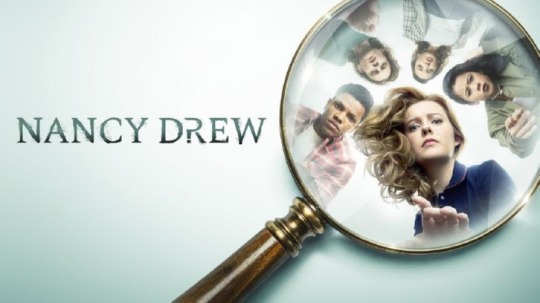
NANCY DREW
If you’ve visited this page recently, you know I have a very strong love for this show. It is the only one I am still watching religiously on the CW and I am tuning in the night it airs. (That is HUGE for me.) IT IS JUST SO GOOD AND I DON’T KNOW WHERE TO START....
2x05 just aired, which would have been the season 1 finale before COVID and I have it saved on my DVR to watch again. There’s just so much I want to relive and catch that I missed the first watch through. It would have been SUCH A GOOD FINALE, but I’m happy that we can continue with new episodes starting next week. And with the way it ended...there’s so much I need to know!! I’m just curious how fast they’re going to develop certain plots. I love the Drew Crew and how they are a family. Each character is so well developed and their chemistry is great. I love learning more about each of them and watching them develop. My favorite character is definitely Ace. I love all his witty lines and how he is opening up more to the group as well as to us, the audience, as we get more of a look into his personal life. I enjoy all of his scenes with his dad and specifically liked when they were celebrating Shabbat. (I am also here for the Nancy and Ace content. I gush more about this on my other blog: lydia-whogowith-stiles. Check it out if you want to hear more.)

THE WATCH
When I watched the Christmas special (or was it New Years? and why does that feel so long ago) of Doctor Who, BBC America kept advertising a new show called the Watch. Due to the extensive amount of commercials, I decided to tape the first two episodes (which premiered back to back) to see what it was all about. I was unaware that this series is based on the book series created by Terry Pratchett. When I came to see if people were talking about it on Tumblr, I saw that a lot of people didn’t like it because of how drastically different it was. As I was unfamiliar with the original, I can’t compare. The TV show was eight episodes and I just watched the last one that aired this past Sunday. I definitely liked the first half of the season more (I noticed my mind start to drift as I watched later ones), but thought the finale was good. I really enjoyed how they incorporated the theme song. I didn’t realize the connection earlier and now can’t stop humming it. (I don’t know if there will be another season or not.) I enjoyed the characters and how it was like nothing I’ve seen on TV before. It got me thinking a lot about blending genres. I would still recommend checking it out.
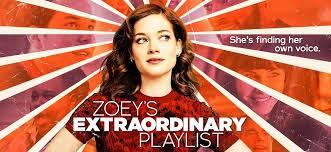
ZOEY’S EXTRORDINARY PLAYLIST
I was VERY excited for this show to come back. I loved the first season so much. It’s just such a heartfelt show and it helped me survive the early parts of quarantine. So far, this season I am noticing how detailed the musical performances are. Mandy Moore is doing an AMAZING job. The choreography is *chefs kiss* I also feel like the song choices have been great and not always the ones I think that would be picked. We are getting to learn more about each character and watch Zoey and her family as they continue life after losing Mitch. I am here for Mo and Max’s restaurant. I think the concept would be so cool in real life. Who knows maybe we’ll see one now. (Max’s rendition of ‘Numb’ was amazing. I’ve never heard the song like that and I think it might be one of my favorites of the season so far.) I hope Max and Zoey get back together by the end of the season. It did feel fast, so I do understand why they had to break up, but it still makes me sad that we watched them get together and then it was taken away from us. The last episode before the break was so powerful and I think the show did an amazing job applying real world issues into their plot. It did not feel forced at all and brought so much awareness. Upset we have to wait so long for a new episode.
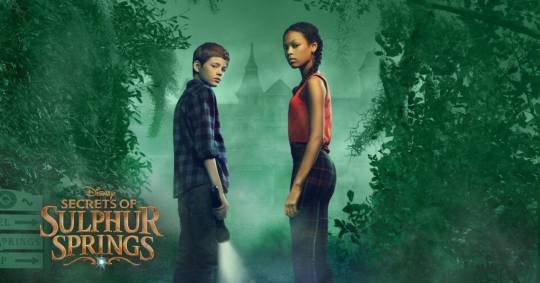
SECRETS OF SULPHUR SPRINGS
Are you looking for a good mystery, but don’t think Disney Channel can provide it? Think again. I have to say, when I started watching I was not expecting this show to be a part of my monthly picks. It pleasantly surprised me. The show involves the mystery of a young girl, Savannah, who went mysteriously missing at camp back in the 90s. Apparently, her ghost still haunts the hotel that was on the camp grounds to this day. Then Griffin and his family buy the hotel with intent of fixing it up and reopening it after all these years. The people in the town think they’re crazy because of its past. But there’s something more going on with Griffin’s dad as well as some of the other adults in the town. They know something about Savannah’s disappearance, but aren’t saying anything about it. While this is a kid’s show (and only half hour episodes) it has been interesting to see where the story will go. I’m sure I am imagining much more intense things for her disappearance than what actually happened. It’s also not super cheesy or have bad acting, which is refreshing. (I really feel Disney Channel has gone down.) Either way, I don’t know how many episodes are left to air, but I think we’re pretty close to the end. If you’re looking for a quick, entertaining mystery I would highly recommend.

MISS SCARLET AND THE DUKE
And here come my period pieces (ironically both from Masterpiece/PBS this time). I know last year I felt like I watched a lot of historical watches at the beginning of the year. We’ll see if that continues to happen this year too. It does serve as a nice escape. Plus, these are some really good stories.
Miss Scarlet and the Duke is a part of Masterpiece Mystery on PBS, although it aired on a different network in the UK. It is (another) mystery series (shocking I know with that title!) It follows Eliza Scarlet who has a nose for mystery, but as a woman living in the Victorian era does not have any rights except for being a wife and mother (two things she would rather not be). When her father dies (apparently from a heart attack...emphasis on apparently), she takes over his Private Investigator business. Much to the dismay of long time family friend William “The Duke” who is a Detective Inspector for Scotland Yard. Eliza is often in his office as she gets arrested for being places she shouldn’t or trying to get information out of him. This element of Eliza having to work in a very male dominated Victorian society is one that I feel I haven’t really seen on a TV show. I really like her dynamic with William. There’s always that feeling of “will they won’t they,” but I don’t feel the show just focuses on that. The mystery is the heart of it all. This last week’s episode was REALLY GOOD. As we got to find out more regarding her father’s death. I hear a lot of people want a season 2 and I am right there with them. This show deserves it.

ALL CREATURES GREAT AND SMALL
Another PBS Masterpiece watch. I love this show, so much more than I was anticipating. It is so heartfelt and makes me so happy and in a good mood after watching it. It follows James Herriot who has recently graduated from veterinary school, but is struggling finding a job. Then he gets a call from Siegfried Farnon’s veterinary practice in Yorkshire. Siegfried is known for having a harsh demeanor and temper, so the assistants he hires don’t often last long. Spoiler alert, that should be pretty obvious, James does. The cast of characters are so lovely and I like all their relationships with one another. The show takes places in the 1930s and I realized I don’t often watch things in this era, so that has been fun to explore. The sets and locations are BEAUTIFUL. In the episodes, we often get these amazing shots that sweep over the exterior and I want to travel to Yorkshire like tomorrow. (See more escapism, it’s great.) The main plot follows everyone interact in the town and watching James become a more confident and experienced veterinarian (which I decided I could never do after watching). I heard that it has been renewed for a second season so that is so fantastic.
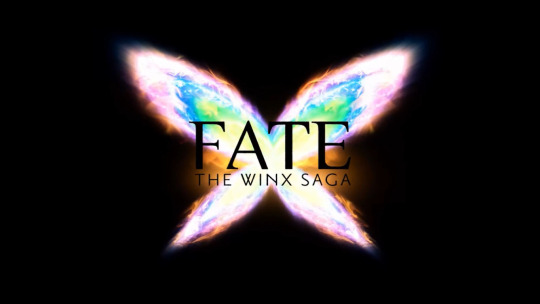
FATE: THE WINX SAGA
The first things I heard about this show was how disappointed everyone was in how they decided to adapt the Winx Club show from their childhood. On this I can agree, but I decided to watch the show anyway. I pretended that it was something new entirely and I have to say I enjoyed it. Of course, there were parts that bothered me and then I had to remember it was a teen show, so angst would be annoying. I think overall it was too short (and should have at least 8 or 10 episodes), but I’m happy that they were able to conclude the main plot well. (Although we did get that cliffhanger, but it is exciting that it was released the show just got renewed for a second season the other day.) I really liked Silva-mainly because it was great seeing Thomas from Downton Abbey in something else. I also enjoyed seeing Jacob Duchman in more things. It was a surprise to see him in Medici and I am just happy he is adding more to his IMDB.

Quick and addicting watch. Add it to your queue. Just forget it’s supposed to be based on something else.
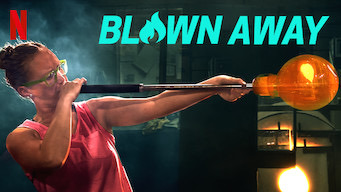
BLOWN AWAY SEASON 2
Continuing with the Netflix picks, one of my FAVORITE picks from 2020 got a season 2 and it is already on Netflix! That’s right Blown Away season 2 is now available. I seriously loved the first season of this show SO MUCH! Glass blowing is such a magical process and I am mesmerized every time I watch it. It felt weird starting this show with all new contestants, but then Alex came back as a guest judge and I was so happy. It is just as addicting and I cannot wait to see who wins this season. I am just trying not to rush the episodes.

VIOLETTA SEASON 3 UPDATE
I know you were all dying to know...
After taking a hiatus from watching during the holidays, I have gotten back into watching the Disney Channel telenovela on Disney Plus. I am now on episode 68. Things are really starting to happen and I am finding myself getting sucked in again, which makes me happy. Episode 60 (pictured above) had A LOT happen and really was a turning point for the second half of the show. Can’t wait to keep watching. Some really awesome songs from these last set of episodes.
AND NOW FOR MY NOT LOVING IT PICK:

LEGACIES
This third season has really disappointed me so far. As I’ve previously discussed on this page, it feels like they are just reusing previous plots from the last two seasons when there is so much more they can do. There was so much promise for this show and I loved the Vampire Diaries and Originals so much, that it’s sad to see Legacies miss the mark. I wish they gave Hope more storylines that didn’t revolve around Landon. She is such a strong character and is SO POWERFUL. This is something we rarely see and it shouldn’t only be shown to save a guy (multiple times). Their couple plot is continually doing the same thing. I want to see a lot more development with this show over this season to keep me watching. I am actually happy that there isn’t a new episode until March 11th. (That’s saying something...)
#tv shows#TV Show Reviews#wandavision#wanda maximoff#jimmy woo#Nancy Drew#nancy drew cw#drew crew#ace#the watch#bbc america the watch#zoey's extraordinary playlist#team max#secrets of sulphur springs#miss scarlet and the duke#eliza x william#all creatures great and small#james herriot#fate the winx saga#jacob duchman#blown away#violetta#Legacies#hope mikaelson
48 notes
·
View notes
Note
sick!!
see i adoreeeee the lyricism



using amen as an example bc its one of my favorites
the way it introduces the religious themes and parallels between victor and (in this case) the executioners is so beautiful and ironic and i love it. i feel like this song also really exemplifies how well the musical translates the story from writing to the stage by getting right into a harmony between these two
also its just very beautiful in general eheh
HI SORRY TO BARGE IN . BUT HAVE YOU LISTENED TO THE FRANKENSTEIN MUSICAL??? ITS SO GOOD. IM OBSESSED WITH "THESE HANDS" PERSONALLY . THANK YOU FOR LETTING ME SCREAM AND SORRY TO YELL
YES I HAVE I LOVW IT SOO MUCH
i would be willing to talk about it foreverrrrr honestly i was crazy about it before i even read the book aha
7 notes
·
View notes